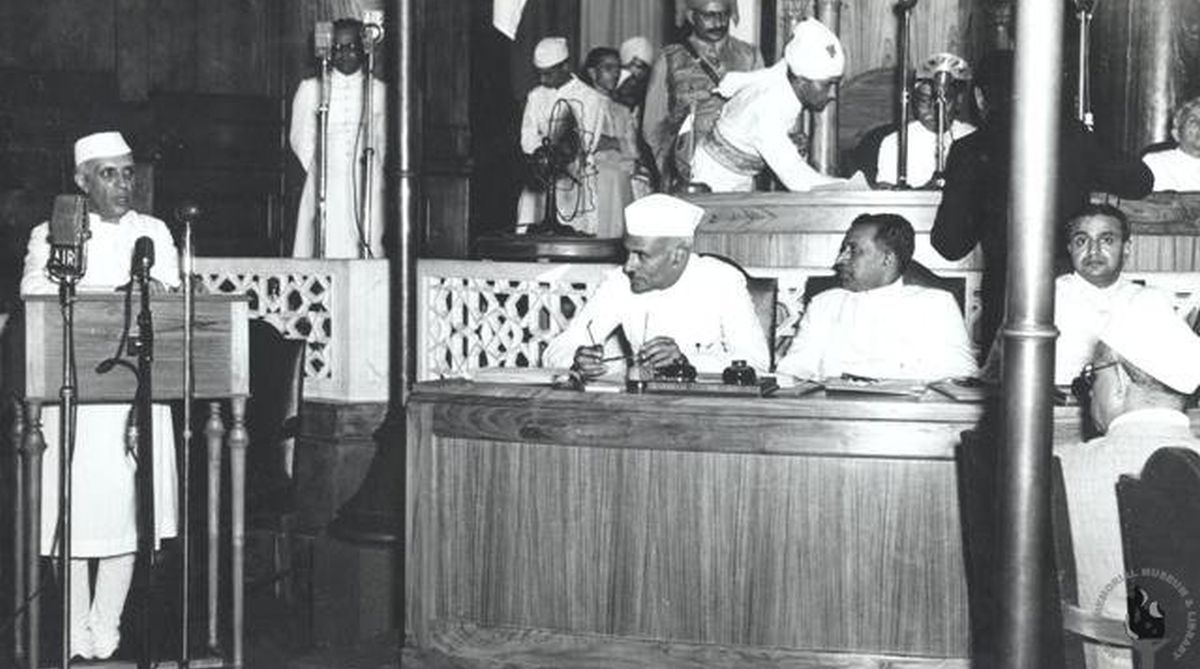2 hardcore Naxalites killed in MP jungles
According to the police, the encounter took place on late night Monday in the jungles near the Kerejhari village under Lanji Police station limits in Balaghat.

Jawaharlal Nehru making his “Tryst with Destiny” speech at the midnight session of Parliament on August 14, 1947. (Photo: Wikimedia Commons)
The author’s biography covers three generations — his grandfather, father and himself; the first two were politicians; the author an industrialist and would-be politician. Ghosh sets his family history in the context of Indian and world history, an attempt that does not really convince. Nor does the originality of the various travelogues sprinkled in the text. He also begins his own autobiographical account after his father dies, which breaks the narrative. A straight-forward chronological story would have been more coherent and instead of the several annexures of little significance, an index would have been more helpful.
Ghosh’s family never lacked for resources, being involved in the tea and paper industries. They also had political connections in plenty. Nalini Ghosh was an MP from 1958 to 1967 and died in 1969 aged 76. Almost seamlessly, but to no surprise in India’s dynastic politics, his son Perumal, an disciple of Atulya Ghosh, was an MP from 1967 to 1971, junior minister of railways and later works and housing. Having lost his seat in 1971, he was appointed ambassador to Turkey from 1981-84 and died in 1985.
Advertisement
The author Diptiman was born in 1946 and busied himself with his family’s industries while keeping connections with political circles, including Maneka Gandhi until she was ejected from the Indira Gandhi household. Diptiman’s wife, who worked as a journalist with Maneka, broke the ties for fear that her father-in-law’s position in Turkey could be adversely affected by Indira’s displeasure. It is deeply disturbing to read of Perumal’s lobbying for a post — governor, Planning Commission, ambassador — even with a despicable low-life character like RK Dhawan, Indira’s private assistant.
Advertisement
On Perumal’s return from Turkey in 1984, he “did the rounds” unsuccessfully to secure a nomination for Diptiman. The author was not put off by the lack of success, and it is highly distressing to read of his hunting for any party that would accommodate his ambitions if not for a parliamentary or assembly seat, then a governorship or ambassadorship. First he lobbied through Priyaranjan Das Munshi in the Congress, then as a go-between for the Janata Dal and CPI-M in Bengal, becoming vice-president of Janata Dal in Bengal from 1992 to 1995, then as state president of the Samata Party of George Fernandes from 1997. He rightly resigned from Samata over Fernandes not criticising the murder of an Australian missionary and his two sons in 1999, and then gravitated to the Forward Bloc. Finally he became national president of the Democratic Socialist Party from which he resigned when DSP refused to condemn the Nandigram firings in 2007.
Repeatedly exploited and discarded by all parties, this is a morality tale for all aspiring politicians in India. Ghosh writes that politicians are “liars and unblinking back-stabbers” and castigates the “mischievous and jealous mindset of the average Bengali politician”. No one can disagree with that, but the surprise is that Ghosh arrives at that clear understanding so late.
Ghosh is critical of Nehru’s undemocratic instincts and of many others — former Congress chief SS Ray (his wife’s uncle) he finds inept, hostile and jealous, Indira Gandhi cynical, Rajiv Gandhi “as arrogant and brash as his younger brother” and Mamata Banerjee “much more selfish than the Left”. He deplores Indira Gandhi’s populism and nationalisation and admires all things American.
The labour problems of Bengal instigated by the CPI-M, made industry untenable expect for the short period under the Emergency, and Ghosh was obliged to liquidate his companies in Bengal and near Delhi. Howrah “once the Ruhr of the East” had become a wasteland, housing complexes having risen where factories once stood. The narratives of Ghosh’s travels in India and abroad will be new to few readers; nor will the deviousness and corruption of politicians, the inertia of bureaucracy and the atrocities of labour under the CPI-M. Ghosh claims to have written this book from memory, though he later admits to using a diary covering some years. The “respected” The Statesman is often cited as authoritative.
This book is not without merit. Those interested in the history of West Bengal politics will find much interesting detail here, though little of it is edifying. There is however much to admire in the women of the Ghosh family. His mother Madhuri was clearly a formidable person, being a constant companion for Ghosh and coming to his rescue in 1970 when he was attacked by Naxalites. She was also injured in the attack but less seriously than he was. His wife Sushmita was also of consequence, carving out successful careers in India and Washington DC.
Ghosh makes some striking comments in his book. India, he writes, has left me with “a feeling of cynicism”, and the people of India “prefer a monarchy”. The book could well have been much shorter, but it is an easy read despite its length, and honestly records the backroom manoeuvres of political people in high positions.
The reviewer is India’s former Foreign Secretary
Advertisement